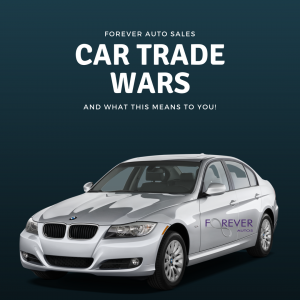 Courtesy of Jalopkin.com..
The car tariffs are starting to hit consumers, FCA’s new CEO has some very large shoes to fill and the trucking industry’s attempts at attracting new drivers await your rapt attention on The Morning Shift for Monday, July 30, 2018.
1st Gear: And Here... We... Go
You know how it was only a matter of time before the cost of the car tariffs would get pushed onto the consumers? Well, that time is now.
Courtesy of Jalopkin.com..
The car tariffs are starting to hit consumers, FCA’s new CEO has some very large shoes to fill and the trucking industry’s attempts at attracting new drivers await your rapt attention on The Morning Shift for Monday, July 30, 2018.
1st Gear: And Here... We... Go
You know how it was only a matter of time before the cost of the car tariffs would get pushed onto the consumers? Well, that time is now.
Advertisement
BMW’s move comes after China imposed new tariffs earlier this month on about $34 billion of U.S. imports, from soybeans and cars to lobsters, as part of a widening trade row. Beijing, which this year cut tariffs on all automobiles imported into China, slapped an additional 25 percent levy on U.S.-made cars as of July 6. As a result, China now levies a 40 percent import duty on all cars imported from the United States. “BMW stands for free (trade) but can’t stand still without taking actions to respond to the market changes,” a BMW spokeswoman said in an email message to Reuters.Yet, the story notes that these rates could suggest that BMW is “willing to absorb much of the higher costs” that come from exporting the vehicles from South Carolina to China. It would be a similar move to Ford’s, which said earlier this year that it wouldn’t raise its prices in an effort to “sustain its business momentum.” China is currently the world’s biggest car market. Getting the Chinese to buy your cars is extremely important. Automakers wouldn’t want to miss out on that, right? 2nd Gear: Will ‘the Kids’ be Alright? News of Sergio Marchionne’s death last week has left speculation regarding the future of the company flying around the industry left and right. Mainly, it’s a lot about how the new CEO, Mike Manley, will run things after his legendary predecessor.
Advertisement
But executives’ loyalty wasn’t necessarily to the company as much as it was to Marchionne — a problem that already has started to play out, with Alfredo Altavilla, the head of FCA’s Europe, Middle East and Africa region, quitting after Manley’s appointment as CEO. Altavilla had been a candidate to succeed Marchionne. Manley said Altavilla’s resignation was “unfortunate, but it was not unforeseen.” He credited the Italian and longtime Fiat executive for returning the region to profitability, while saying he was confident Altavilla’s unnamed replacement would be able to push profit margins higher. “I don’t see his departure at all impacting our strategy,” Manley said. Without Marchionne, it remains to be seen whether more departures are on the horizon.Manley really has his work cut out for him. He’s inheriting a culture that adored and revered Marchionne. Because his death was so sudden and unexpected, there probably won’t be a smooth transition. Automotive News thinks Manley is going to have some challenges ahead of him as he tries both nuture other aspects of the company and complete the five-year plan. If he can pull that off, then he’ll have a chance to be seen as successful. 3rd Gear: There’s a Trucker Shortage Whether you like it or not, much of America’s goods depend on trucks to reach their destinations. Your booming economy doesn’t mean squat if you don’t have enough truckers to distribute your products.
Advertisement
Facing record driver shortages, trucking companies “are making the adjustments because they have to,” said Kevin Reid, the founder of the National Minority Trucking Association. “The industry has not focused on recruiting and retaining the next generation,” Mr. Reid said. “Trucking is an industry that needs to be rebranded. There was a cool factor to trucking in the 1970s and 1980s. We don’t have that now, so the question is, how are we going to reach the next generation of truckers?” Women and minorities make up just fractions of the overall trucking population: 94 percent of drivers are men, and two-thirds of all drivers are white, according to a 2017 report released by the American Trucking Associations.It seems that trucking companies need to reach young people, women and minorities if they are going to make it in this changing economy. 4th Gear: More Hydrogen Fuel Cell Cars from Toyota As we’ve reported time and time again, part of what is keeping hydrogen fuel cell cars from really catching on are the high costs of the technology and the lack of infrastructure. Toyota is really aiming to tackle the first half of that problem.
Advertisement
“We’re going to shift from limited production to mass production, reduce the amount of expensive materials like platinum used in FCV components, and make the system more compact and powerful,” Yoshikazu Tanaka, chief engineer of the Mirai, said in an interview with Reuters. It is planning a phased introduction of other FCV models, including a range of SUVs, pick-up trucks, and commercial trucks beginning around 2025, a source with knowledge of the automaker’s plans said. “We’re going to use as many parts from existing passenger cars and other models as possible in fuel cell trucks,” said Ikuo Ota, manager of new business planning for fuel cell projects at Toyota. “Otherwise, we won’t see the benefits of mass production.”There’s also talk of bettering performance in terms of driving range. Toyota believes that FCV demand will increase as more countries realize that EV batteries materials become harder and harder to come by.
Advertisement
Advertisement
As part of the reorganization it has struck an agreement with labor representatives that includes a pledge to secure jobs and invest in German sites, it said.This move should help Daimler cars, trucks and mobility stuff have more control over growing and expanding in the coming years. As long as nobody touches my AMGs, Daimler can do whatever the hell it wants.




